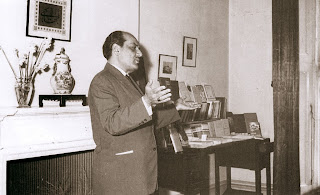Dear friends of the United States of America. Your National
Assembly has given me a special honor and privilege to talk to you about the
Mother Book of the Bahá'í Faith, the Kitáb-i-Aqdas. I first give you the
outline of this page with the hope that you will follow the subject matter one
by one, and I pray that it will be well received by all the dear ones in that
vast country.
First, the order in Bahá'u'lláh's life and His writings. Second,
the revelation of the Book of Aqdas, where, in what year, how long. Third, the
two gifts given to mankind through the Book of Aqdas. Fourth, this book is a
gate through which mankind enters the age of maturity. There are many reasons
for these, but three will be given here. Fifth, is the last one, and most
important one. What is it, what exists in this Book which makes it the Mother
Book of our Faith and this Dispensation?
Now we will start one by one, and before I start I pray to
God that He will confirm me and strengthen me to do justice to this great
subject.
Simplicity is the basis and order of Bahá'u'lláh's life. It
rules throughout His ways and manners of living, including garments, residence,
furniture, His approach to His friends and followers, and as a matter of fact,
to all the people of the world. The same order applies to His Writings. All are
easy to read, to follow and understand. Almost every Tablet starts with the praise
of God, and immediately after that, He starts to answer questions put to Him by
the believers. His answers are always direct, frank, to the point, and concise.
There are, however, some exceptions to this rule and there are obvious reasons
for such exceptional cases. I mention three of these exceptions.
The first is the Tablet to the King of Persia, Násiri'd-Dín
Sháh. The language is very exalted and in some parts the vocabulary is very
powerful and difficult to understand. The reason is this, that the King had
been surrounded by the divines, who always boasted of their knowledge of the
Arabic language. Bahá'u'lláh, Who had never been to their schools, by using elaborate
words and perfect melodious sentences desired to awaken and address the King
and his entourage to the source of His revelation, the greatness of His Cause,
and the exceptional power with which He had been endowed. When the King
received this Tablet, he sent it to the divines of his country and asked them
to compose a suitable answer, but none dared to even a sentence which could be
compared with the perfection of words, style and melody used by Bahá'u'lláh in
that great Tablet.






















